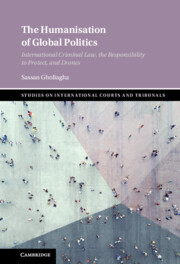 The Humanisation of Global Politics
The Humanisation of Global Politics Book contents
- The Humanisation of Global Politics
- Studies on International Courts and Tribunals
- The Humanisation of Global Politics
- Copyright page
- Dedication
- Contents
- Figures
- Tables
- Preface
- Acknowledgements
- Materials Used
- Abbreviations
- 1 The Humanisation of Global Politics
- 2 Humanisation in IR Theory and International Law
- 3 The Social Construction of the Individual Human Being
- 4 Guilty and Innocent
- 5 Heuristics and Positions
- 6 Protecting the Individual Human Being from Mass Atrocities
- 7 Killing the Individual Human Being via Drones
- 8 The Individual Human Being as a Theoretical Category
- Appendices
- References
- Index
4 - Guilty and Innocent
The Individual Human Being in International Criminal Law
Published online by Cambridge University Press: 25 August 2022
- The Humanisation of Global Politics
- Studies on International Courts and Tribunals
- The Humanisation of Global Politics
- Copyright page
- Dedication
- Contents
- Figures
- Tables
- Preface
- Acknowledgements
- Materials Used
- Abbreviations
- 1 The Humanisation of Global Politics
- 2 Humanisation in IR Theory and International Law
- 3 The Social Construction of the Individual Human Being
- 4 Guilty and Innocent
- 5 Heuristics and Positions
- 6 Protecting the Individual Human Being from Mass Atrocities
- 7 Killing the Individual Human Being via Drones
- 8 The Individual Human Being as a Theoretical Category
- Appendices
- References
- Index
Summary
Chapter 4 presents the first of the three case studies. Entitled ‘Guilty and Innocent: The Individual Human Being in International Criminal Law’, it analyses the discourse on prosecution with a focus on the ICC. This case study illustrates the applicability and value added of the theoretical and conceptual frameworks. Furthermore, I draw heuristics from this first case study to guide my analysis of the two other case studies, which I embed in a larger analytical framework developed in Chapter 5. Apart from these theoretical and methodological purposes, the chapter has a substantial purpose, demonstrating how the individual human being appears in the discourse on prosecution and how this appearance matters for global politics. The case study shows how the individual human being appears as a perpetrator or victim. This appearance is based on assertions of innocence and guilt, which makes prosecution and the deliverance of justice to individual human beings possible in the first place.
Keywords
- Type
- Chapter
- Information
- The Humanisation of Global PoliticsInternational Criminal Law, the Responsibility to Protect, and Drones, pp. 66 - 101Publisher: Cambridge University PressPrint publication year: 2022
